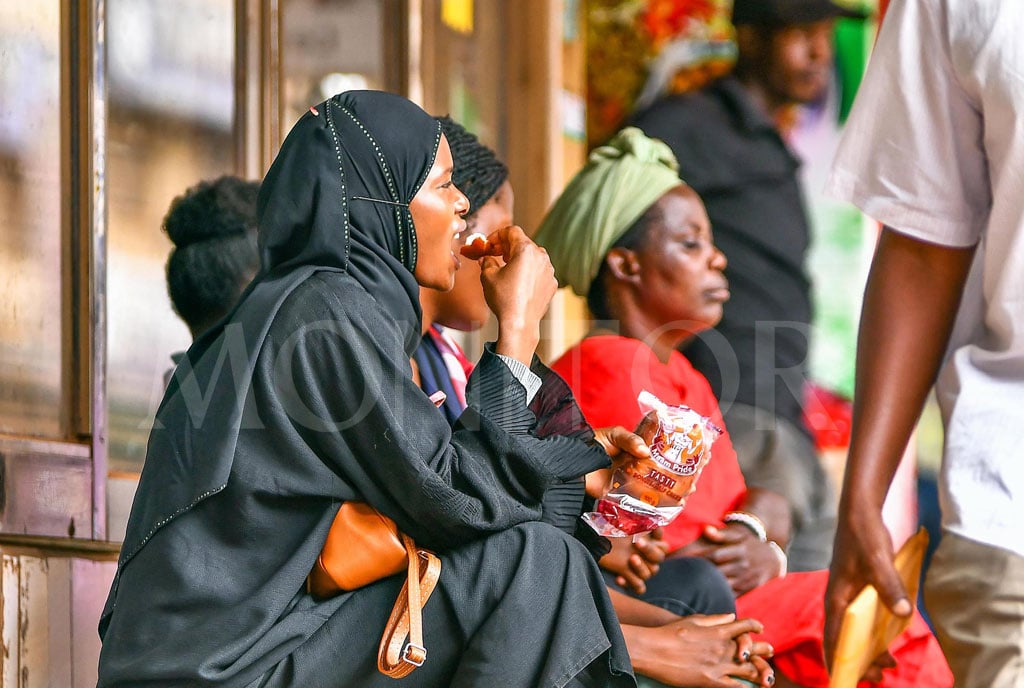Health drinks raise public safety concerns in Ankole

A man shows some of the energy products on the market in Mbarara District on Tuesday. PHOTO / RAJAB MUKOMBOZI
What you need to know:
- A mini-survey conducted by Daily Monitor shows that more than 150 types of health drinks are manufactured in the districts of greater Ankole, including Mbarara, Rwampara, Isingiro, Sheema, Buhweju, Rubirizi, Mitooma, Bushenyi, Ntungamo, Ibanda, and Kiruhura.
Residents and the leadership in Ankole Sub-region have raised concern over the safety of nutritional and therapeutic value drinks that have flooded markets.
They claim some of the companies involved in the production of these drinks are not certified, putting lives at risk.
Daily Monitor has learnt that such companies sponsor misleading adverts on radio stations to woo unsuspecting clients into buying their products, most of which are fake.
A mini-survey conducted by Daily Monitor shows that more than 150 types of health drinks are manufactured in the districts of greater Ankole, including Mbarara, Rwampara, Isingiro, Sheema, Buhweju, Rubirizi, Mitooma, Bushenyi, Ntungamo, Ibanda, and Kiruhura.
According to the survey, a new drink hits the market monthly in shops and supermarkets without any visible quality and standard mark or proof of certification.
Mr Enock Kariisa, the Bushenyi deputy district Internal Security Officer, said the manufacturing of the drinks has created fear and anxiety among locals.
“I think the National Drug Authority (NDA), line ministries and agencies need to carry out rigorous regulation and sensitisation of manufacturers and consumers because unregulated production of these drinks is causing more harm than good,” he said.
Mr Godson Oribariho, a resident of Kakiika, Mbarara, said some of the some of the products are made from homes.
“They are produced in empty bottles picked from dustbins yet people are consuming these products that have not been certified for public use,” Mr Oribariho said.
Mr Aidan Kusingura, a businessman in Mbarara Town, attributes the influx of the products on the market to a self-regulated economy.
‘It is only in Uganda where someone wakes up one day and claims to be an expert in anything. I recently tried to find out whether they are certified but in vain. One wonders who cares about the safety of Ugandans,” Mr Kusingura said.
Dr Peter Ssebutinde, the Mbarara District health officer, said efforts should be stepped up to regulate the manufacturers. The NDA southwestern regional manager, Mr Kenneth Kiiza, said they are working at ensuring that all advertisements are vetted.
He, however, acknowledged that some radio stations illegally run misleading adverts.
NDA warns
‘We have had a challenge of manufacturers coming up with wild claims, which is wrong and I urge them to stop that habit. We have, together with other agencies engaged nutritional drinks manufacturers to desist from giving misleading information,” Mr Kiiza said.
“The habit has reduced but we still have a challenge of local radio stations, which are not cooperative. We want them to run adverts that are vetted by NDA,” he added.
Mr Chris Mugasha, a coordinator at Rukararwe Rural Partnership Development, attributed the problem to numerous certification agencies, which makes it hard for manufacturers to choose whom to use, thus ending up doing what they want.
Mr Mugasha also said the drinks are threatening the environment.
‘They are also becoming a problem to the environment because after consuming them, members of the public dump empty plastic bottles in the open, leaving a negative impact on the ecosystem,’ he said. The Mbarara City mayor, Mr Robert Mugabe Kakyebezi, proposed a heavy fee to be levied on producers.
“We are going to start levying a fee from these manufacturers of these energy drinks; they are now the largest contaminants of water sources and channels such as River Rwizi. There are also regulatory bodies such as UNBS (Uganda National Bureau of Standards) who should come to our aid and save the population,” he said.
Producer says
Ms Agnes Asasiirwe, a manufacturer of Atamba Energy Drinks, said they cannot stop environmental pollution because it is expensive to implement.
“It is not possible for us to go collecting our brand bottles. But even other companies that have lived for years such as Coca Cola can’t manage it.
Authorities should put in place laws to deter individuals against littering; this is the better way to manage waste than going for manufacturers,” Ms Asasiirwe said.
“As manufacturers, we have a responsibility, we pay taxes let them use these taxes to manage waste,’’ she added.
Mr Jeconious Musingwire, the western region National Environment Management Authority (Nema) coordinator, said littering of plastics from manufactured health drinks remains a big challenge.
“Look at River Rwizi, plastic bottles remain one of its biggest pollutants, especially at points where it shares boundaries with urban areas. Plastics are not affecting only water bodies but even land because they take many years to decompose but also may release toxic substances to the soils,” he said.
He added: “We already have laws against waste disposal but we also need to come out with other regulations that compel those that generate this plastic waste to be responsible for their disposal including recycling. Before licensing companies that generate waste including plastic, they should have a waste management plan but unfortunately some of these may be operating illegally.”
Mr Francis Mugarura, producer of Ntuuza Tuganire, said: “We take all the caution to ensure our drinks are safe, including sanitation and hygiene at our production premises. But if there are other energy drinks on market that are not safe for human consumption then the blame should be on regulators.”
He added: “We are prepared to work and comply with any safety regulations as may be guided, including environment protection.”




